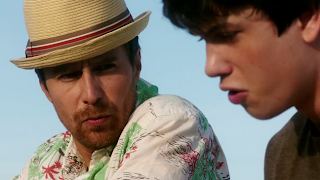A Life Unlived
by Mark Dispenza
Fruitvale Station is not your typical social justice film. Its message is not steeped in populist outrage, but is all the more effective in its subtle focus on promise unfulfilled.
Ryan Coogler could not have picked a better time to release his first feature, a story about a preventable tragedy that resulted from the escalation of violence.
Michael B. Jordan and Melonie Diaz
Michael B. Jordan (Chronicle) is stellar in his depiction of Oscar Grant, an unarmed 22-year-old man who was shot dead on New Year's Day 2009 by a Bay Area Rapid Transit police officer. He and his friends were detained following a scuffle on one of the train cars. Grant was unarmed and face-down on the ground when one of the officers inexplicably drew his pistol and fired a shot into the young man's back. Doctors were unable to save him, and he died later that morning.
Witnesses on the packed commuter route recorded the scene on their cell phones, so there was never any question of what happened. The officer later claimed that he intended to grab his Taser, but drew his gun by accident in the heat of the moment. He was charged with first degree murder but convicted of involuntary manslaughter and served 11 months of a two-year sentence.
The public was outraged and the incident became a cause celebre for black activists and others who work in the cause of social justice. It continues to resonate today. Coogler's film concludes with footage from a vigil held this past year on the anniversary of the incident at the Fruitvale BART Station.
Octavia Spencer
Although the shooting incident is the climax of the film, the story shows little of its aftermath, especially the politics of it. Instead it largely follows Grant for the 24 hours immediately preceding his death, treating the audience as voyeurs, witnesses who observe the action but are not led in any obvious direction. I say "obvious" because this is not a documentary. Coogler, who also wrote the script, has taken the liberties of a storyteller to frame Grant's life. In using that approach he allows the audience to get to know Grant as a man, and not as anybody's political symbol.
The camera follows Grant as he alternately argues with and demonstrates his love for his girlfriend, his mother, his sister, his young daughter, and even his closest friends. Octavia Spencer plays Grant's mother in a way that leaves no doubt she loves her son, even if she has to be tough on him at times. The audience is introduced to Grant as a man - imperfect, impetuous, temperamental, loyal, loving and struggling to make his way in a world that often stymies him.
Many of the best films have a scene in which the audience sees the hero in a moment alone, safe from the intrusion and the judgement of others. In that moment the hero's true character emerges. There is such a moment in Fruitvale Station, when Grant encounters a stray dog. The dog provides the opportunity to see Grant as he truly is, and it also serves as a metaphor for the tragedy to come.
Michael B. Jordan and Ariana Neal
Even though I watched the video of the incident at the Fruitvale BART Station, as did many others, I can't tell you what went on in the mind of the officer who shot Grant. It's plausible that he did draw his pistol by mistake. It's also plausible that in that moment, he reacted in the heat of his anger and fear, and whether consciously or not, he intended to fire that fatal shot. Witnesses to the actual incident recalled his horror and emotional distress at the results of his action, as his rational mind caught up with his emotion.
And that brings us to the real cause of the tragedy. Cool heads did not prevail on either side, and the incident was allowed to escalate until the unthinkable occurred. The debate about the root cause of the tragedy will continue, with all sides claiming the exalted status of victim, and minds will become hardened and entrenched deeper in their opinions.
Each side will escalate and perpetuate the cycle of conflict, just as they do everywhere in the world today - nation against nation, race against race, religious sect against religious sect. We don't talk about the tragedy of what is being lost . Instead we selfishly seek status as the most aggrieved and then profess outrage when the others don't see it that way.
But when all is said and done, there is a hole in the world that Oscar Grant once occupied. There is a daughter who will never again laugh and play and share secrets with her father. There is a mother who lost her son, and there aren't many losses in this world equal to that. Only a mother can cherish a child so deeply, despite all of the trials and tribulations he puts her trough.
There is a sister who will never again be able to depend on her brother to cover her own shortcomings, and a girlfriend who lost a cherished lover and will never know what happiness the future might have brought or what pain.
There are friends who will never again be able to count on him to have their back when times get rough, and there are strangers who will miss his everyday acts of kindness in days yet to come.
And that's the kind of conversation we should be having.
.jpg)








